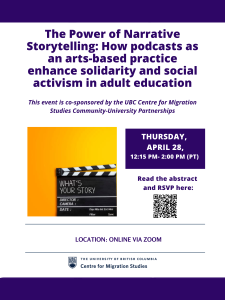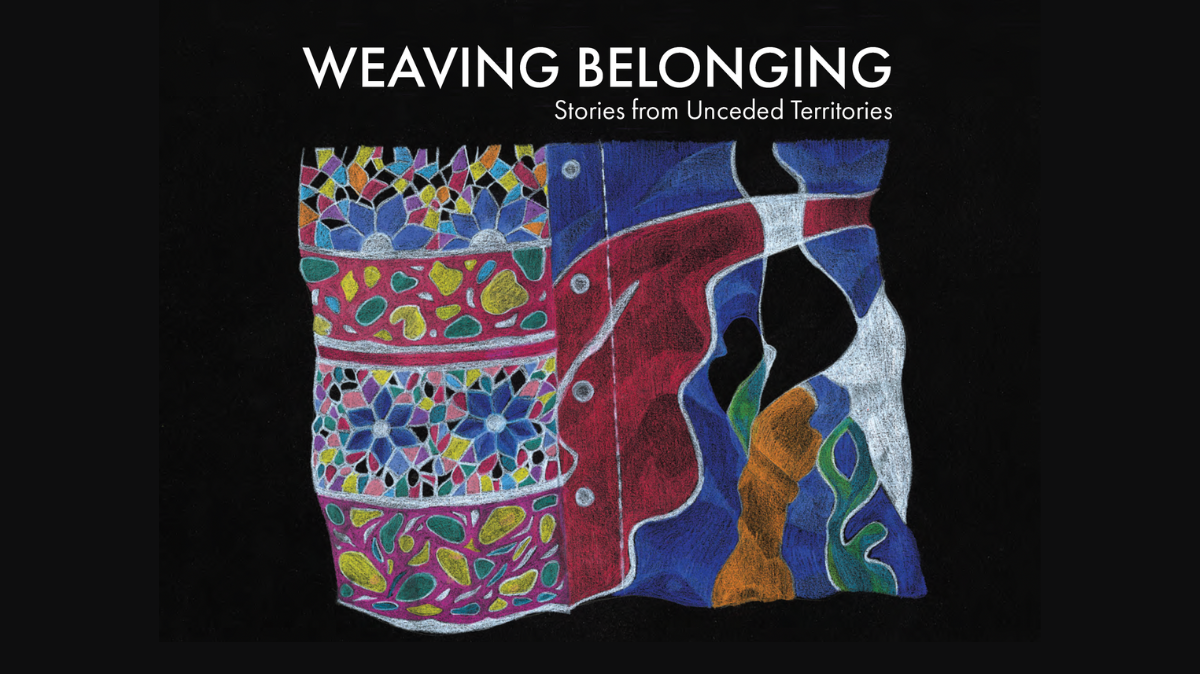
The Power of Narrative Storytelling: How podcasts as an arts-based practice enhance solidarity and social activism in adult education
Thursday, April 28, 202212:15pm- 2:00pm — Pacific Time (PT)Location: Online via ZoomFree & open to the public. To register, fill out the RSVP form below.
[Abstract]
This presentation emerges from a podcast hosted by the Centre for Migration at the University of British Columbia (UBC) in 2021. In this discussion, we explore how podcasts offer a unique and often under-researched arts-based medium that can be used as a form of creative expression to tell stories, build dialogue, and create solidarity. We argue that podcasts offer benefits and learnings not only to the listeners but also to participants who are part of the creation process. We conclude that the podcast created spaces of disruption, public pedagogy, and praxis.
[Bios]
Amea Wilbur is an Assistant Professor at the University of the Fraser Valley. She received an Ed.D. from the University of British Columbia in 2015. In 2017, she received the AMSSA Award for her work with marginalized populations and for innovative programming that supports diversity and promotes integration.
Zahida Rahemtulla is an emerging writer of fiction and theatre. Her plays, The Wrong Bashir and The Frontliners are currently in development in Vancouver. She has worked in Vancouver’s immigrant and refugee non-profit sector for several years in the areas of housing, employment, and literacy and is currently completing an MA in Adult Education at the University of Toronto.
Emily Amburgey is a doctoral candidate in Anthropology at the University of British Columbia, Vancouver, Canada. She is a socio-cultural anthropologist, and her work explores the impacts of climate change and labour migration in high altitude regions of Nepal’s Himalaya. She is also an affiliate of the Centre for Migration Studies at UBC.
Shanga Karim was a journalist and women’s activist in Kurdistan where she worked in the humanitarian sector as she focused on violence against women, honor killing, and female genital mutilation. Shanga is a Vancouver local coordinator for the Shoe project (https://theshoeproject.online/about-the-shoe- project). She has a passion for writing and writes stories for other websites, and one of her stories has been selected as the best to be published by The Vancouver Writers Fest.
Diary Khalid Marif is an Iraqi Kurdish journalist. He has a master’s degree in History from Pune University in India. He worked with a TV channel (KNN or KNNC) in his home country as a documentary researcher. He later moved to Vancouver, Canada in 2017 and he has been writing nonfiction in English. He joined SNtC given that he wants people to know about his stories and interact with Canadian writers.
Camille McMillan Rambharat, from Trinidad and Tobago, is known for getting into “Good Trouble”. She’s married to a politician; a mother of 3 leaders; a career development coach, activist and workplace bullying and harassment survivor. Camille advocates for fair and transparent reporting and investigation policies in the workplace and leadership that puts an end to bullying and harassment.
